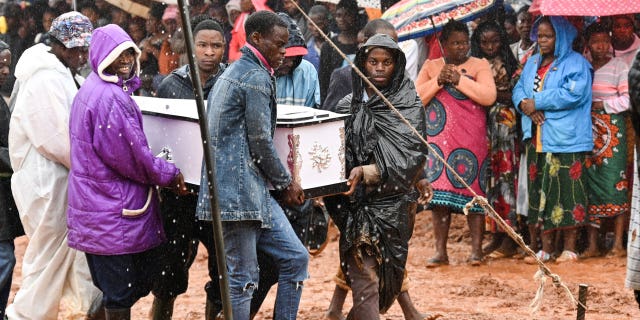
After killing hundreds and displacing thousands as it barreled through Mozambique and Malawi since late last week, Cyclone Freddy has dissipated over land, although flooding remains a threat in both countries, a regional monitoring center said late Wednesday.
The cyclone has killed at least 225 people in Malawi’s southern region including Blantyre, the country’s financial hub, according to local authorities. Another 88,000 people are displaced. In neighboring Mozambique, officials say at least 20 people have died since the storm made landfall in the port town of Quelimane on Saturday night. Over 45,000 people are still holed up in shelters, with about 1,300 square kilometers still under water, according to the EU’s Copernicus satellite system.
“There are many casualties — either wounded, missing, or dead and the numbers will only increase in the coming days,” said Guilherme Botelho, the emergency project coordinator in Blantyre for Doctors Without Borders. Malawi, which has been battling a cholera outbreak, is at risk of a resurgence of the disease, Botelho said, “especially since the vaccine coverage in Blantyre is very poor.”
CYCLONE FREDDY RIPS THROUGH SOUTHERN AFRICA KILLING HUNDREDS, DEATH TOLL EXPECTED TO RISE
The aid organization has suspended its outreach programs to protect its staff against flash floods and landslides but is supporting cyclone relief efforts at a local hospital.
Freddy was initially projected to exit back to the sea on Wednesday but has since waned and is no longer classed as a tropical cyclone, the United Nations’ weather monitoring center in Réunion said.
But even with the cyclone having dissipated, “the emergency will not be over for many communities as rain from upland areas continues to flood downstream areas over the coming days,” said Lucy Mwangi, the country director for Malawi at the aid organization Concern Worldwide.

Hundreds have been left dead in Mozambique and Malawi in Cyclone Freddy’s wake. (AP Photo/Thoko Chikondi)
“Even rich countries that are advanced democracies would have been no match for the level of destruction this cyclone has brought,” said Kim Yi Dionne, a political scientist at the University of California Riverside. Freddy has accumulated more energy over its journey across the Indian Ocean than an entire U.S. hurricane season.
Yi Dionne said that the scale of damage is despite Malawi’s disaster agency having prepared and planned “for the challenges that come with our contemporary climate crisis.”
Scientists say climate change caused by mostly industrialized nations pumping greenhouse gases into the air has worsened cyclone activity, making them more intense and more frequent. The recently-ended La Nina that impacts weather worldwide also increased cyclone activity in the region.
African nations, who only contribute about 4% of planet-warming emissions, are “once again paying the steepest price to climate change, including their own lives,” said Lynn Chiripamberi, who leads Oxfam’s southern Africa humanitarian program.
Cyclone Freddy has caused destruction in southern Africa since late February, pummeling Mozambique as well as the islands of Madagascar and Réunion last month.
CYCLONE FREDDY STORMS THROUGH SOUTHERN AFRICA KILLING AT LEAST 44 IN MOZAMBIQUE, MALAWI
“Freddy is quite an exceptional weather phenomenon,” Anne-Claire Fontan, a tropical cyclone scientific officer at the World Meteorological Organization told The Associated Press. Its longevity, distance covered, the number of times it has intensified and the amount of energy it accumulated over time has been extraordinary, she said.
She added that its second landfall in Mozambique “is explained by the presence of two competing steering influences. It is not rare.”
CLICK HERE TO GET THE FOX NEWS APP
Freddy first developed near Australia in early February. The U.N.’s weather agency has convened an expert panel to determine whether it has broken the record for the longest-ever cyclone in recorded history, which was set by 31-day Hurricane John in 1994.

 Latest Breaking News Online News Portal
Latest Breaking News Online News Portal




